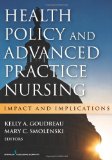Health Policy and Advanced Practice Nursing Impact and Implications This title has been archived.

Author: Kelly Goudreau, PhD, RN, ACNS-BC, FAAN, Mary Smolenski, EdD, MS, FNP, FAANP
Affiliation: Veterans Affairs Southern Oregon Rehabilitation Center and Clinics
Publisher: Springer Publishing Company
Publication Date: 2014
ISBN 10: 0826169422
ISBN 13: 9780826169426
eISBN: 9780826169433
Edition: 1st
Affiliation: Veterans Affairs Southern Oregon Rehabilitation Center and Clinics
Publisher: Springer Publishing Company
Publication Date: 2014
ISBN 10: 0826169422
ISBN 13: 9780826169426
eISBN: 9780826169433
Edition: 1st
Description:
Designed to meet the requirements of both the IOM report on The Future of Nursing and the DNP criteria V for inclusion of health policy and advocacy in the curriculum, this is the only text to satisfy DNP and MSN policy courses for all advanced practice nurses. Unlike most health policy textbooks that address only the NP role, it is equally geared to the needs of CNSs, CNAs, and CNMs. The text encompasses evolving health care policy and reform in the U.S., Canada, and internationally, addressing its impact on advanced practice nursing, APRN roles, care for special needs populations, health care quality, and patient safety. The book brings together a wealth of information that was previously dispersed among separate articles and is written by highly qualified luminaries in the field: Dr. Goudreau is the Immediate Past President, past Secretary, and current Board Member of the NACNS, and Dr. Smolenski was Director of Certification Services at the ANCC for eleven years, directing certification for over 150,000 nurses in more than 30 specialties. The text focuses on identifying and discussing current trends in health care, including the Institute of Medicine's "Future of Nursing" document, current patterns emerging in Accountable Care Organizations, and health care reform in the U.S. and Canada. It discusses issues surrounding the regulation of APRNs, the role they can take in shaping their local regulatory environment, and international perspectives on how APRNs can impact the care of citizens in their domain. In order to provide content relevant to a universal APRN readership, each section of the text presents information from four APRN perspectives: those of NPs, CNSs, CNAs, and CNMs. For all of these roles, the book covers the implications of current and future health policy changes for APRN practice.
Related Titles
